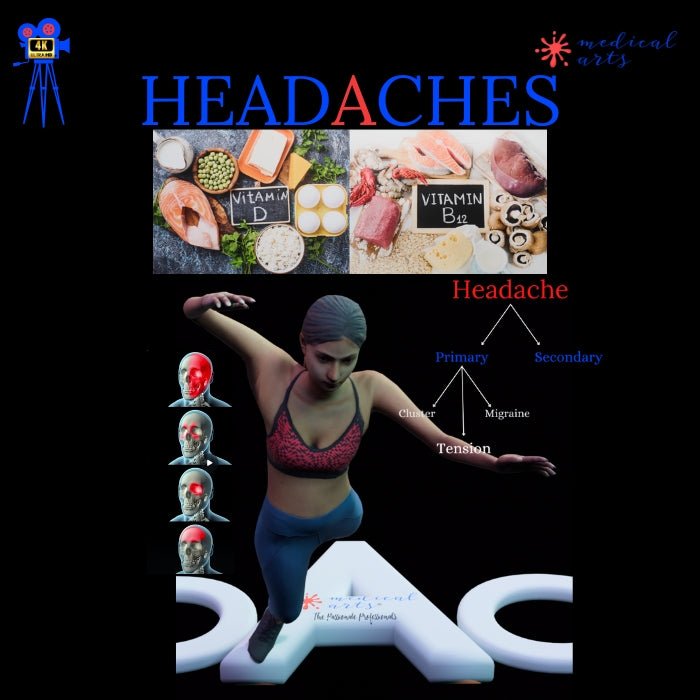This page is currently under construction, come back soon!
Headache, also known as cephalgia, is one of the most common physical complaints experienced by humans.
Rather than being a disease itself, a headache is a symptom that can signal various underlying issues.
These can range from organic diseases like neurological disorders to responses triggered by stress, vasodilation (as seen in migraines), or skeletal muscle tension (as in tension headaches).
Headaches are broadly classified into two categories:
primary headaches and secondary headaches.
-
Primary Headaches are standalone conditions where the headache itself is the main issue. This category includes:
- Migraines (with or without aura)
- Tension-type headaches
- Cluster headaches and paroxysmal hemicrania
-
Secondary Headaches arise as symptoms of other medical conditions, which can include:
- Headaches due to structural issues, such as those associated with brain tumours or head trauma
- Vascular-related headaches, like those following a subarachnoid hemorrhage
- Intracranial disorders, such as a brain tumour
- Headaches linked to substance use or withdrawal
- Infections not directly involving the head
- Metabolic disorders, such as hypoglycemia
Here are some natural treatment for tension headaches:
Stress Management: Techniques such as deep breathing, meditation, and progressive muscle relaxation can help reduce stress, a major trigger for tension headaches.
Physical Therapy and Exercise: Regular physical activity, especially exercises focusing on stretching and strengthening the neck and shoulder muscles, can prevent tension buildup.
Acupuncture: This traditional Chinese medicine practice involves inserting thin needles into specific points on the body to relieve pain and tension.
Herbal Remedies: Herbs like peppermint oil (applied topically) and feverfew have alleviated headache symptoms. However, it's essential to consult with a healthcare provider before using herbal supplements.
Adequate Hydration: Dehydration is a common headache trigger. Ensure you drink enough water throughout the day.
Proper Sleep: Establishing a regular sleep routine and ensuring enough rest can help prevent headaches.
Massage Therapy: Regular massages, especially focusing on the neck and shoulders, can help relieve muscle tension contributing to headaches.
Dietary Considerations: Avoiding common dietary triggers such as caffeine, alcohol, and processed foods can help reduce the frequency of tension headaches.
Aromatherapy: Essential oils like lavender or eucalyptus can be inhaled or applied to the skin to help reduce headache symptoms.
Biofeedback Therapy: This technique helps you learn how to control physiological functions such as muscle tension, heart rate, and blood pressure, which can reduce headache frequency and intensity.
Cold or Warm Compresses: Applying a warm compress to the neck or a cold compress to the forehead can soothe tight muscles and relieve headache pain.
Yoga and Stretching: Practicing yoga can help release muscle tension, improve posture, and reduce stress, all of which can prevent tension headaches.
Sound Therapy: Listening to calming sounds or specific frequencies, such as binaural beats or white noise, can help relax the mind and body.
Vitamin B12 and Vitamin D Supplements: Vitamin B12 and Vitamin D deficiency have been linked to an increased risk of headaches. Vitamin B12 plays a crucial role in nerve function and red blood cell formation, while Vitamin D is essential for overall brain health and reducing inflammation.
Magnesium Supplements: Low levels of magnesium are linked to headaches. Taking magnesium supplements or increasing magnesium-rich foods might help prevent them.
Dietary Adjustments: Keeping a food diary to identify and eliminate headache triggers (like certain foods or additives) can be beneficial.
Limit Screen Time: Reducing screen time and taking frequent breaks can prevent eye strain, a common trigger for tension headaches.
Hydrotherapy: Alternating between hot and cold showers can improve circulation and reduce muscle tension, potentially easing headaches.
Caffeine Moderation: While caffeine can help reduce headache pain, it can also be a trigger for some people. Monitoring and adjusting your caffeine intake could be key.

